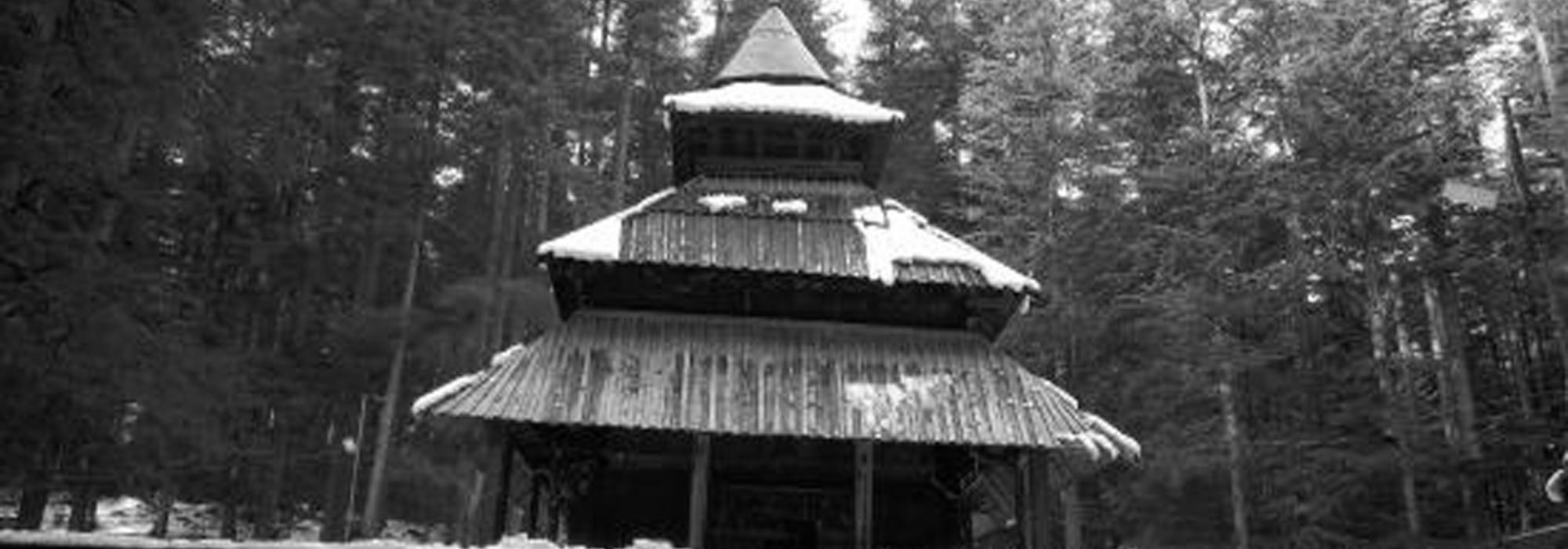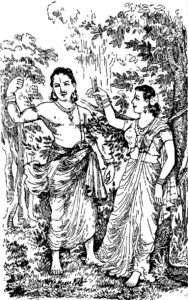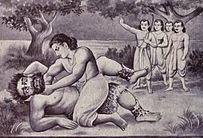After their escape from Vāraṇāvata, the Pāṇḍavas went southward, moving quickly in the light of the stars, and reached a dense forest. By this time, all of them were exhausted, tormented by thirst and overcome by sleep; at that point, Dharmarāja told Bhīma, "Trapped in this dense forest, we are groping in the dark; we are unable to tell the directions; we are unable to walk any further; is there a greater difficulty than this? We don't know whether that wretched Purocana succumbed in the fire or not; how do we escape from our fear of him? We shouldn't be seen by anyone. Therefore, once again, you must carry us all and take us to some place safe, brother! You are the only strong one among us all!" Thus, they moved on, stopping and hiding every once in a while fearing Duryodhana, and by evening reached a part of the forest that had neither roots nor fruits nor drinking water; only cruel animals and birds of prey; it was twilight; overcome by hunger, fatigue, and sleep, their legs refused to move. Then Bhīmasena took them to a large Banyan tree and put them down. He said, "Get some rest here; I shall look for some water nearby and bring it; I can hear the cries of cranes [sārasa birds - Sarus cranes - “Antigone antigone”]; so there must be water somewhere around here." Taking their leave, he went in the direction of the sounds made by the cranes. He found water; he drank all the water he could, bathed, and brought some water in his uttarīya [upper garment]. By the time he returned, all of them had fallen asleep on the ground! Upon seeing them he felt deeply distressed and said, "Alas! Those who were unable to find sleep on the lavish beds in Vāraṇāvata are now in deep sleep on the ground. Kuntī is the sister of Vasudeva, the daughter of Kuntibhoja, the daughter-in-law of Vicitravīrya, and the wife of Pāṇḍu; a delicate damsel as tender as the inside of a lotus, who would sleep on a soft bed in a regal home; she bore children through Dharma, Vāyu, and Indra; what can be more painful and lamentable than seeing such a princess sleep on the ground, exhausted? This dharmātmā who is worthy of ruling over the three worlds, this Arjuna of extraordinary talent and prowess, these twins of exceeding beauty and radiance are all fallen on the ground, fatigued, sleeping like common men. Is there anything sadder than this? In this world, only he lives in peace who doesn't have kinsmen who bring infamy to the lineage; he becomes sacred just like the sole fruit-giving tree in a village; everyone respects him, worships him. Those who have many courageous kinsmen who adhere to dharma are like trees in a forest; together with their relatives and friends as well as their children, they support each other, become powerful and live in prosperity. That evil-hearted Dhṛtarāṣṭra and his sons drove us out of the city; by some means we escaped the fire and have found shelter under this tree. Where do we go from here? Such a terrible misfortune!" Thus he lamented. Then he thought: "There seems to be a city not too far away from this forest; but they are all asleep during a time they need to be awake. Well, let them sleep! I shall stay awake. Let them drink the water after they wake; by that time, their tiredness would also have cooled." Having decided thus, he sat down without falling asleep.
At a short distance from where the Pāṇḍavas were asleep, there dwelt on a Sal tree ['śāla' tree - Shorea robusta] a rākṣasa named Hiḍimba. He was powerful, malicious, and loved human flesh; he was ugly and ferocious to look at; his eyes were like embers. Struck by hunger, as he looked around for food, he came upon the Pāṇḍavas; he scratched at the coarse hairs on his head and yawned in a despicable manner; he repeatedly inhaled the smell of human beings; he called his sister and said, "After many days, I have found my favourite food; my tongue is soaked in saliva; my eight pointed canines should plunge into soft flesh and get soaked; I will suck dry the warm blood that will pour out of the throat. Go at once and find out who are those people sleeping under that tree. My nose is awash with the tantalizing smell of humans; if you can kill them yourself, go ahead; kill them and bring them to me. Both of us shall eat it; go fast!"
In accordance to her brother's wish, she went near the tree; she found the Pāṇḍavas and Kuntī asleep while Bhīma sat next to them, awake. No sooner than she saw Bhīma, she fell in love with him. She told herself, "This mighty-armed hero, handsome,dark-skinned, with lotus-eyes is a worthy husband to me; I shall never obey the wicked command of my brother; the love for a husband is always stronger than the affection for a brother. If I kill them now, my brother and I will get a hearty meal and we will be satisfied for an evening! But instead, if I live with him, I will be happy for a long time." Thinking thus, she assumed the form of a beautiful maiden and slowly went towards Bhīmasena, with coyness and gaiety. She smiled at him and said, "Sir, who are you? Where have you come from? Who are these people, verily like gods, sleeping here? Who is this lovely maiden? How is she related to you? She is sleeping here, sans all worries, as if she were sleeping in her own home! This is a forest infested with rākṣasas; my brother Hiḍimba, the rākṣasa, desires to eat your flesh and therefore has sent me here to take a look. But having set my eyes on you, indeed a match to the gods, I have given my heart to you; I tell you the truth: I do not wish to make anyone my husband but you. Having fallen for you, I offer myself to you; make me yours! I will save you from my man-eating brother. We shall dwell happily in the mountains and the valleys. Become my husband. I can travel in the skies, so you can find pleasure with me wherever you wish!" Bhīma said, "O rākṣasī, this is my mother and my brothers; when they are in deep sleep, can I leave them as food for the rākṣasa and give in to lust?" The rākṣasī replied, "Wake them up; I shall do whatever pleases you. I will protect you from the rākṣasa." Bhīma said, "Rākṣasī, my mother and brothers are sleeping in peace; I shall not disturb them merely out of fear of your brother. Is there a rākṣasa who can withstand my might? Go if you wish; stay if you wish; do whatever you want; or if you like, go and send your man-eating brother!"
After waiting a while for his sister, Hiḍimba wondered why she was delayed, descended from his tree and went to the place where the Pāṇḍavas were resting. When she saw him approaching, Hiḍimbā told Bhīma, "There goes the evil man-eating rākṣasa; he's coming here to eat you up. Listen to me; wake up your sleeping brothers and mother; I shall carry all of you on my hips and fly away in the skies; then we may be able to escape from him!" In response Bhīma said, "Fear not; what can he do when I'm here? I will kill him in front of your eyes; have you seen my arms, how are they? Each arm is like an elephant's trunk. Don't deem me weak because I'm human!" Those words reached the ears of Hiḍimba. He saw that his sister had assumed the form of a beautiful maiden and was standing beside a man; she had a round moon-like face; well-drawn eyebrows; a slender nose; long eyes; polished nails; soft skin; a fine sari; wonderful ornaments; hair bedecked with flowers. He realized that she had fallen for the man and threw a sharp glance at her with his large eyes. He said, "Who is this, coming in the way of my food? Hiḍimbā, aren't you afraid of my anger? You stand there, lusting for a man, although you know that it does not please me. Fie upon you! You have brought disgrace to all the great rākṣasas of our lineage! I shall destroy you and all these men at once!" Saying so, he reddened his eyes, gnashed his teeth, and stepped forward. Seeing him advance towards them, intent upon wreaking havoc, Bhīma roared at him saying, "O evil one! Stop! Stay! Do you dare raise a hand to strike a woman? What is her fault? If your rākṣasa lineage is disgraced, it is definitely not because of her; it is due to her lust for me; you cannot kill a woman as long as I'm around; instead, I will kill you, come! Let the dogs and foxes eat your corpse; let people roam about this forest without fear or worry!" Hiḍimba said in response, "Why do you brag? Keep your boasts aside! I shall kill you first and then these people who are asleep; and finally I shall kill her too." Saying so, he lunged towards Bhīma and caught his arms. With a laugh Bhīma held his arms in a vice-like grip as he tried in vain to wriggle out of it; Bhīma then lifted the struggling Hiḍimba and threw him. He fell at a distance of eight bows. He returned and with a great roar, seized Bhīma with a firm grip. Worried that his roar would awaken his brothers, Bhīma dragged him away to a distance. They fought like elephants and in the process, many plants and trees were uprooted. The din awoke Kuntī and the Pāṇḍavas; and when they were shaken out of their slumber they saw Hiḍimbā standing in front of them. Enchanted by her beauty, Kuntī asked her in gentle words, "Who are you? Why have you come here? Are you a forest-goddess or an apsarā dwelling in this forest? Why are you standing here?" She said,
"This is the rākṣasa Hiḍimba's forest; I am his sister; my brother sent me to kill you all; when I saw your golden-hued and valorous son, I lost my heart to him and chose him as my husband. I tried to lure him away but in vain; wondering why I was delayed, my brother himself came to kill you all. My beloved seized him and dragged him away from here; there, you can see them fighting each other!" Thus she narrated her tale. As soon as they heard these words, Yudhiṣṭhira and his brothers got up at once and saw Bhīma and Hiḍimba engaged in combat, having held each others' arms firmly and pushing each other forwards and backwards! The dust that arose resembled the smoke emanating from a forest fire! When Arjuna saw that the rākṣasa was harassing Bhīma, he said with a laugh, "Don't be afraid, Bhīma! We fell asleep due to tiredness; we didn't know that you had to fight this ghastly fellow. If you wish, I shall rush to your aid; Nakula and Sahadeva can take care of Mother!" Bhīma replied, "Just watch and do nothing; don't worry; having fallen into my clutches, how can he escape alive?" Arjuna said, "O Bhīma, what's the point in keeping this wretched rākṣasa alive for so long? We have to proceed further; we can't stay here for too long; also, the east is already getting red; in this raudra-kāla, rākṣasas become stronger; therefore, stop playing Bhīma! Kill him fast. If not, he will begin illusional warfare, using magic powers. Use the strength of your arms and crush him!" Hearing these words of Arjuna, Bhīma held up the rākṣasa with his arms and rotated him a hundred times. "Having consumed flesh and filled your body with fat, you have grown to such gigantic proportions; unfortunately you're going to lose all this at your death!" said Bhīma in a mocking tone. Arjuna said, "O Bhīma! If he's proving too heavy for you, shall I help you out? Kill him at once! If not, I shall kill him; it looks like you're tired; get some rest!"
Hearing those words, Bhīma lost his patience and threw Hiḍimba with great force on the ground; making a ball out of Hiḍimba's body, Bhīma snuffed out his life. Just as he breathed his last, the rākṣasa let out a loud roar and just like the sound of a wet drum, it filled the entire forest. Bhīma tore his dead body into two. The Pāṇḍavas were delighted to see the death of Hiḍimba. Arjuna said, "Brother! There seems to be a city quite close to this forest; let us go there quickly and reach the city lest Duryodhana finds us." They all agreed and began moving forward with Hiḍimbā in tow.
Looking at her, Bhīma asked, “Why do you follow us, Hiḍimbā? The rākṣasas are known to deceive people using their magical skills, while they harbour hatred in their belly; just go away. If not, I’ll make sure you follow your brother’s path!” Upon hearing that, Yudhiṣṭira said, “Watch out Bhīma! You might kill her out of your anger! Preserving dharma is greater than safeguarding one’s own body; you have killed the rākṣasa who had come to harm us; what can her sister to do us, after all, even if she is angry?” Hiḍimbā bowed down to Kuntī and Yudhiṣṭira and with folded hands said, “Mother, you understand a woman’s sorrow; I am looking for the right time to get over the sorrow; it seems like my happy days are awaiting me; leaving behind my relatives and friends, ignoring the dharma that befits my kind, I’ve followed your son to obtain him as my husband. Please trust my words. I shall take him with me and bring him back later; whenever you think of me and seek my help, I shall come to your rescue, carry you all on my shoulders to a safe place; please give us your best wishes – I shall marry Bhīma. Only this can keep me alive; it will bring you all puṇya and is dharma too; for those who adhere to dharma, divergence from dharma is a great misfortune.” Upon listening to her words, Yudhiṣṭira said, “What you say is true, Hiḍimbā! Follow my advice and treat the path of dharma. Once Bhīma takes his bath and finishes his daily rituals, you may meet by him by sunset. As you can travel faster than the mind, you may spend the day in his company as per your desire, but bring him back to us every evening.” Hiḍimbā agreed, carried Bhīma and travelled through the skies. She took him to mountain tops that were rich with resources, filled with beautiful trees and animals. She took him to tīrtha-kṣetras, spent time on dazzling wooden seats and spent joyful hours with him – she was in her tender and charming form all the time. In due course, she gave birth to a son named Ghaṭotkaca through Bhīma. The child, which had red eyes and sharp canines, looked scary. He turned out to be a mighty warrior like Bhīma; he became youthful even in his early days and mastered several weapons; the Pāṇḍavas were fond of him. He promised that he would come to their help when required and headed towards the north; Hiḍimbā too returned to her usual life.
[As the child’s head, which had no hair, looked like a pot, Bhīma suggested that he be named Ghaṭotkaca.
It was the will of Indra that Ghaṭotkaca should be born, and at a later point in time, would protect his son, Arjuna from the fatal weapon, śaktyāyudha of Karṇa. - Verse 38, adhyāya 143, Ādi-parva - Critical Text]
To be continued…
This is an English translation of Prof. A R Krishna Shastri’s Kannada classic Vacanabhārata by Arjun Bharadwaj and Hari Ravikumar published in a serialized form. Thanks to Śatāvadhāni Dr. R Ganesh for his thorough review and astute feedback.
Additional segments from the epic and notes by the translators have been added in the footnotes after going through the Critical Text of the Mahābhārata.














































